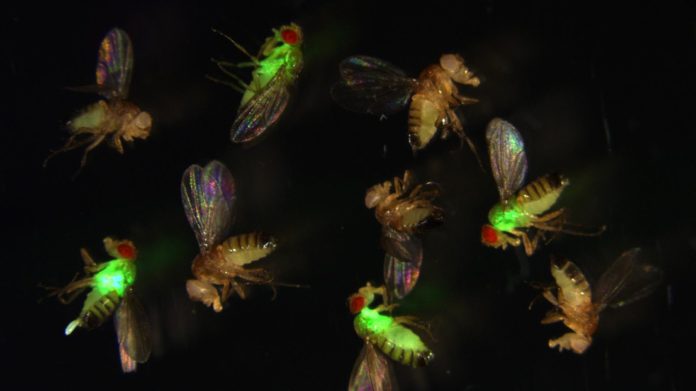Antimicrobial peptides and proteins (AMPs) are a diverse class of naturally occurring molecules that are produced as a first line of defense by all multicellular organisms. These peptides can have a broad activity to directly kill bacteria, yeasts, fungi, viruses, and even cancer cells.
AMPs are produced by the host’s (e.g. the human’s) cells and combat invading microorganisms by breaking apart their cell membranes or by disrupting their functions. In spite of their significance, we know very little about AMPs.
Since years, scientists are trying to study them in living organisms, but isolating the effect of individual AMPs in a living organism is a very complex proposition.
But now, it is possible via using modern tools. EPFL scientists conducted a study on fruit fly where they used CRISPR, the gene-editing technique, to delete no less than 14 AMPs from the fruit fly Drosophila.
By erasing single AMP genes, different blends of genes or even each of the 14 genes, the scientists could evacuate their comparing AMPs and see how their nonappearance influenced the fly’s resistance from various bacterial and parasitic pathogens.
The results showed that, at least in Drosophila, AMPs act mainly against Gram-negative bacteria (e.g. E. coli, Enterobacter species) and certain fungi. The AMPs also work either together or by adding up their individual effects.
Scientists also found that certain AMPs can be incredibly specific in defending against certain infections (e.g. the AMP diptericin against the pathogen P. rettgeri). This unexpected result highlights a previously unknown level of specificity to the innate immune response.
Mark Austin Hanson, the study’s first author said, “What’s really exciting is that these results will help us understand how our own AMPs might help fight infection. It could be that some people have a defective copy of a specific AMP needed to prevent a common infection – as an example, uropathogenic E. coli – and so they are at higher risk. Fighting infection is great, but learning how to prevent it in the first place is the ideal of medicine. That’s what these AMPs do: they prevent infection before it ever settles in.”
“But the applications of studying AMPs go even further. Studying how the fly’s AMPs work can also help us manage economically important insects, whether it be protecting bumblebees or preventing mosquitoes from spreading disease.”
The study is published in the journal eLife.
